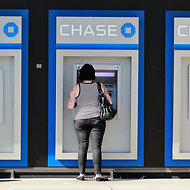 Justin Sullivan/Getty ImagesJPMorgan Chase’s credit card business and commercial lending operation showed signs of improving.
Justin Sullivan/Getty ImagesJPMorgan Chase’s credit card business and commercial lending operation showed signs of improving.
JPMorgan Chase kicked off bank earnings season on Friday with news that its quarterly profit dropped 23 percent last year, results that weighed on the full-year profit.
The bank turned a $19 billion profit in 2011, up 9 percent from $17.4 billion a year earlier, as its credit card business and commercial lending operation showed signs of improving. The results amounted to $4.48 a share, up from $3.96 a share last year.
But the profit engine stalled in the fourth quarter, when JPMorgan earned $3.7 billion, or 90 cents a share, down 23 percent from the same quarter a year earlier. The results matched analysts’ estimates for the period.
The fourth-quarter slump was owed in part to declining revenue and a slowdown in JPMorgan’s sprawling investment bank, which suffered from the sluggish economic recovery in the United States and concerns that the European debt crisis would sweep across the Continent.
The investment bank booked a $567 million accounting loss in the fourth quarter tied to the perceived riskiness of its own debt, reversing a one-time gain from the previous quarter that propped up earnings across Wall Street. In all, the unit’s profit sank 52 percent to $726 million in the fourth quarter.
Shares of JPMorgan were down more than 3 percent, to about $35.55, in morning trading.
Despite the turmoil in the fourth quarter, Jamie Dimon, JPMorgan’s chairman and chief executive, highlighted the firm’s gradual progress since the financial crisis. He also sounded a note of cautious optimism about the broader economic recovery.
“We have a mild recovery that might actually be strengthening,” Mr. Dimon said in a conference call with reporters, adding that the comeback appears to be “broad.”
The bank’s earnings report comes a day after Mr. Dimon announced the second major shuffling of his management team in a year. Among the changes, Jay Mandelbaum, head of strategy and business development, will leave the bank. And Barry Zubrow, JPMorgan’s risk management chief who guided the bank through the financial crisis, will now head corporate regulatory affairs.
With the steady growth in profit last year, JPMorgan has emerged from the crisis as one of Wall Street’s most dominant firms. In 2011, JPMorgan stripped Bank of America of its title as the nation’s biggest bank by assets. Bank of America is still struggling to shed the legacy of the subprime mortgage mess.
“JPMorgan is in the best position for no other reason than they don’t have the troubles that Bank of America has,” said Jim Sinegal, an analyst with the research firm Morningstar.
While JPMorgan had some recent bright spots in its core businesses, the gains were padded by the bank’s decision to set aside $730 million in fewer reserves for loan losses. Additions to the reserve are an expense.
Much of the change came from reserves held for the bank’s credit card portfolio, which has steadily improved. The move also benefited Chase Retail Financial Services, the bank’s consumer banking arm that offers everything from mortgages to checking accounts. The unit earned $533 million in the fourth quarter, up from $459 million a year earlier.
Commercial lending was a particular strong point for the bank. The unit’s profit rose to a record $643 million, a 21 percent increase from the prior year, as lending to corporations grew for the sixth consecutive quarter.
“I believe that you are seeing real loan growth,” Mr. Dimon said on the conference call. “And I think that will continue.”
But his bank’s earnings improvement last year was overshadowed by the fourth-quarter woes and a drop in revenue. Revenue fell to $99.8 billion, down from $104.8 billion last year, as new federal rules reined in fees tied to overdrafts and debit cards. The $567 million accounting loss also weighed down revenue.
The revenue struggles are not unique to JPMorgan, a diversified bank seen as a gauge for the performance of Wall Street. When the nation’s other big banks — Goldman Sachs, Morgan Stanley, Citigroup and Bank of America — report earnings next week, most are expected to detail similar slowdowns in revenue.
“It’s hard to think of a bright spot on the revenue side,” Mr. Sinegal said. “That issue is going to linger.”
Article source: http://feeds.nytimes.com/click.phdo?i=d710d9b241fa91b827c3b950d0151213
Speak Your Mind
You must be logged in to post a comment.